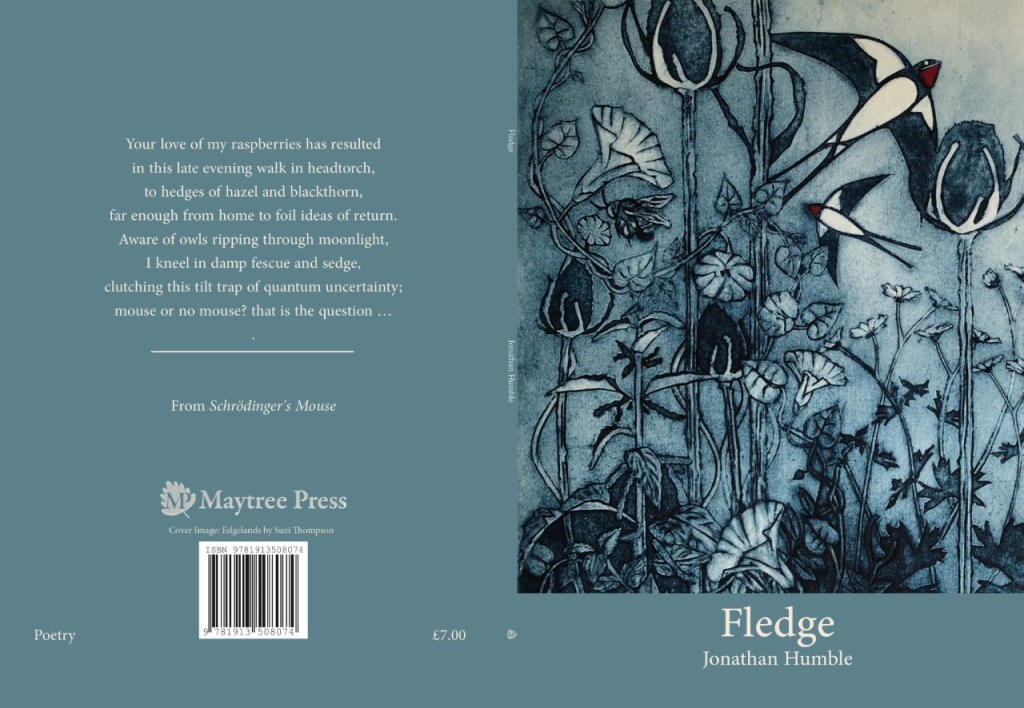
As an ex primary teacher myself, I imagine poetry lessons with Jonathan Humble must be highly entertaining and loved by pupils in the school in Cumbria where he teaches. I haven’t read his verse for children, but a playful sense of humour comes over in many of the poems in this new collection from Maytree Press.
In the title poem, ‘Fledge’, the poet’s own childhood is vividly drawn. I loved the ‘skinned knee congregation of risk takers’ and the sly reference to Larkin, all brought together by reference to a black and white photo of ‘unwashed eight year olds’. This is affectionate nostalgia without Larkin’s gloominess. In ‘Fireweed’ the life of another ‘risk taker, the leader of their childhood games, has ‘a body confident in the friction of bare skin.’ From the wild energy of ‘he peed higher, spat further, swore louder’ the poem turns much darker with a punch in the last two stanzas; we learn that although his ‘spark burned fierce’ it was ‘snuffed out / in a consumptive breeze.’
A close observation of the natural world brings many of the poems in this collection alive. There is a child-like simplicity in ‘Little Rowan’: the tree is directly addressed and all the accompanying mythology evoked; but, ‘Caught in Concrete’ strikes a more convincing, nuanced chord. A sycamore has started growing in ‘damaged concrete’ and the poet offers his services to rescue the ‘lost tree’, ending the poem with humour: ‘I have a spade. / I know a place. / Just say the word’. Similarly ‘Elegy for a peevish bee’ describes this drive to rescue. And, in others, he saves a spider fallen into a bath, and a mouse is released into the wild but the poet ‘soft clart that I am’ secretly hopes it won’t be eaten by an owl.
The imagery in many of these poems is strong and draws out the reader’s empathy. We’re usually on the side of the underdog – a worm ‘exposed like a pulsing nerve’ is a ‘meal fixed in a yellow-ringed eye; a hawk on the poet’s garden gate is ‘a striped waist-coated bully’ and the poet himself is potential prey when he is strafed by a curlew, his ‘crescent beaked nemesis’ and falls off his bike. ‘In Boots like these’ is reminiscent of Wordsworth’s ‘Daffodils’ where memories of the tranquility of the natural world are ‘In this mind’s refuge’.
Like ‘Fireweed’, there are poems that evoke strong emotions. ‘Leveret’ details the loss of a child. I’m reminded of Karen McCarthy Woolf’s profoundly moving collection ‘An Aviary of Small Birds’, written after the devastating still birth of her child. In Humble’s poem tender images of ‘leverets that hid away in the sweet grass’ are described in musical blank verse; the emotion is all the stronger for being held in check by the pentameter, and there is an unbearable sadness in the ‘wee blue shoes that you would never wear.’
A few poems resonated less with me and even after several readings I couldn’t tease out what they were ‘about’. But they created a strong atmosphere which is always a good sign. For instance ‘Yew’ which I took to be a pun on ‘You’, hinted at something dark and unresolved, with a range of negative images: ‘discordant notes, ‘canker in the bark, ‘taint the air’ and ‘blemish’. This particular poem left me feeling confused, but that may well be the poet’s intention and it is definitely atmospheric and moody. And of course poems work on so many levels so can’t readily be explained. That’s their point. Poet, Don Paterson has famously described what is unique about a poem as an art form:
… a poem is just a little machine for remembering itself… We merely recall a string quartet or a film or a painting, actually, at a neurological level we’re only remembering a memory of it; but our memory of the poem is the poem.
A Yorkshire directness and choice of often monosyllabic, blunt English make many of these particular poems memorable. And both the love of the natural world and an infectious sense of humour make them enjoyable.
You can read Jonathan Humble’s blog here: https://northernjim.wordpress.com/
Buy Fledge from Maytree Press here:
Thank you so much for taking the time to review Fledge, Ali. I couldn’t have asked for a more incisive and empathetic response to the poems. I am very grateful.
Best wishes
JH x
LikeLiked by 1 person
You’re welcome, Jonathan. All the best. 😁
LikeLike
Thank you for letting me review such an enjoyable collection of poetry, Jonathan.
LikeLike